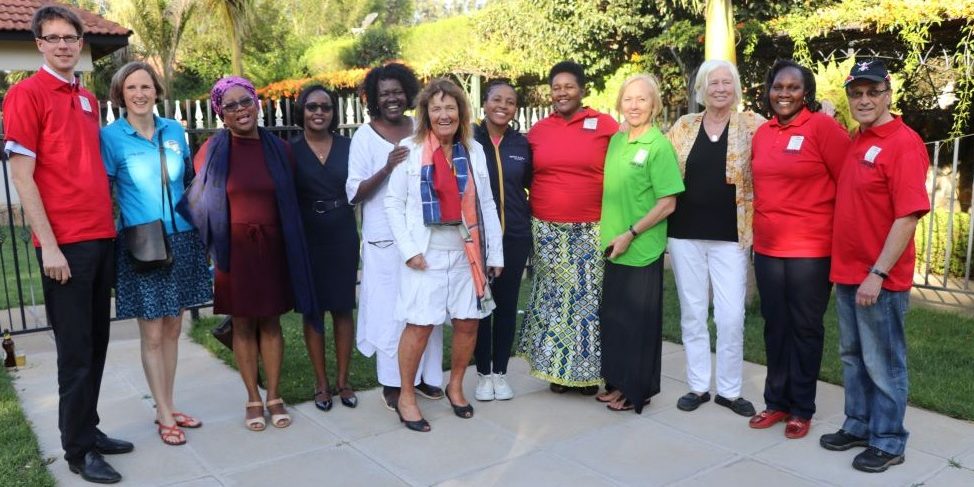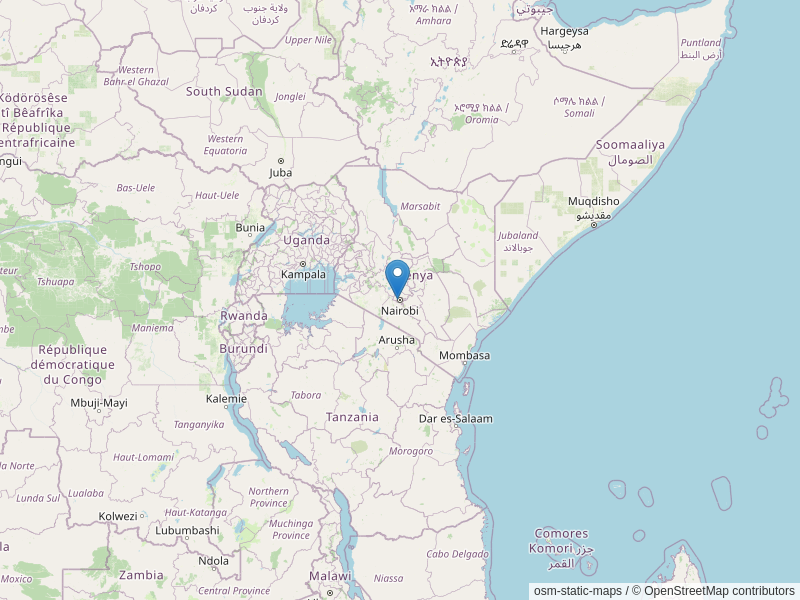Questions to the Centers of Excellence funded by the DAAD with funds from the Federal Foreign Office

Please briefly introduce yourself and the Center of Excellence!
Dr. Susan Kurgat
 My name is Susan Kurgat, the Project Coordinator of the East and South-African German Centre of excellence in Educational Research Methodologies and Management (CERM-ESA) in Kenya. I am a Senior Lecturer in the Department of Curriculum Instruction and Educational Media at Moi University in Kenya. I also teach, supervise, and examine postgraduate students at Moi University. I have served on several high school management boards within the community.
My name is Susan Kurgat, the Project Coordinator of the East and South-African German Centre of excellence in Educational Research Methodologies and Management (CERM-ESA) in Kenya. I am a Senior Lecturer in the Department of Curriculum Instruction and Educational Media at Moi University in Kenya. I also teach, supervise, and examine postgraduate students at Moi University. I have served on several high school management boards within the community.
CERM-ESA is a joint project between Moi University (Kenya), Nelson Mandela University(South Africa), University of Oldenburg(Germany), University of Dar es Salaam(Tanzania), and Uganda Management Institute(Uganda). CERM-ESA’s main objective is to advance and expand excellent and innovative educational research on methodologies, instruction, and management strategies for African contexts. To achieve our goal, CERM-ESA has four major programmes that run concurrently: building research capacity in the partner Schools of Education for sustainable institution-building and excellent, innovative educational research in, about, and for Africa, teaching and training future leaders in research methodologies, innovative management solutions and instruction techniques at Master’s and Doctoral levels, providing professional development courses and workshops for academic, teaching, and administrative/ management staff of all partner Schools of Education to further their education and supporting teachers and principals in advancing their competencies in relevant areas of educational practice, curriculum implementation, and management in their local contexts.
Mr. Petro Protas
 My name is Petro Protas, the Coordinator of the Tanzanian-German Centre for Eastern African Legal Studies (TGCL) at the University of Dar es Salaam, Tanzania.
My name is Petro Protas, the Coordinator of the Tanzanian-German Centre for Eastern African Legal Studies (TGCL) at the University of Dar es Salaam, Tanzania.
TGCL commenced in the year 2008 and until now has continued to be a unique and highly specialized centre which offers postgraduate programs (LL.M and Ph.D.) in Regional Integration and East African Community Law. Its scholars are drawn from all the Partner States of the East African Community (EAC) among lawyers aspiring for leading positions in the region. TGCL has a reputation for being one of the key institutions in training future leaders in the legal field in the EAC and beyond. Scholars at TGCL benefits from its internationalization structure and a range of programs offered at the University of Dar es Salaam School of Law (Tanzania) in close collaboration with the University of Bayreuth (Germany).
Prof. Fred Barasa
 I am Fred Simiyu Barasa, a Professor of Comparative and International Education and the Vice Chancellor of Taita Taveta University in Voi, Kenya. I am also a DAAD alumnus, having immensely benefitted from the DAAD In-Region Scholarship that enabled me to successfully pursue a doctoral programme at the University of Natal in South Africa and graduated with a PhD in the year 2000. I have extensive experience and expertise in University Management, Research and Education Consultancy.
I am Fred Simiyu Barasa, a Professor of Comparative and International Education and the Vice Chancellor of Taita Taveta University in Voi, Kenya. I am also a DAAD alumnus, having immensely benefitted from the DAAD In-Region Scholarship that enabled me to successfully pursue a doctoral programme at the University of Natal in South Africa and graduated with a PhD in the year 2000. I have extensive experience and expertise in University Management, Research and Education Consultancy.
Taita Taveta University hosts the Centre of Excellence for Mining, Environmental Engineering and Resource Management (CEMEREM) as one of the DAAD-supported Centres of African Excellence network. CEMEREM is a joint project of Taita Taveta University (TTU) in the Coastal Region of Kenya, and two Partner Universities in Germany – the University of Applied Sciences, Dresden (HTWD) and TU Bergakademie, Freiberg (TUBAF). The main objective of CEMEREM is to promote sustainable development of the natural resources sub-sector in Kenya and the wider East Africa.
2) The program objective states that the centres of excellence should improve the quality of education provided, increase research capacities and enable future decision-makers in Africa to be trained according to international standards. Are these goals achieved?
Dr. Susan Kurgat
CERM-ESA has achieved several goals in all its four programmes to date:
Under the academic programme, several full scholarships for the Master of Education in Research programme and Ph.D. programmes have been awarded. The student and lecturers’ exchange programme has taken place, resulting in sharing of research knowledge, skills, and attitudes. The research outputs have tremendously improved in the following thematic areas: i) Pedagogies and Education research methodologies and in African contexts ii) Community schools and engagement for social development iii) Education for sustainable development, and iv) Languages, indigenous knowledge, and arts.
The lecturers and supervisors have been trained on excellent research methodologies and supervision through the capacity-building programs. These have led to a paradigm shift in the research outputs and the scholarship holders’ effective and efficient completion rates. The teachers from the community schools, too, have benefited immensely from the programme’s modern teaching methods.

Mr. Petro Protas
TGCL has met all these goals. The centre has remained keen on maintaining the quality of education for its scholars and ensuring that international standards are adhered to in all its programmes. Programmes at TGCL are designed to enable students to conduct coursework and engage in research activities. As part of research activities, students at TGCL are required to undertake a special program on the ‘Advanced Research Seminar’ offered by the School of Law. This program enables them to acquire the necessary skills to prepare for their LL.M dissertations and Ph.D. Theses.
Additionally, TGCL has two research limbs to be utilized by researchers. The first one is the TGCL Series which consists of edited volumes of papers presented at conferences and workshops organized by TGCL. These conferences and workshops are ordinarily multidisciplinary and involve economics, political science, psychology, history, and law researchers. These conferences have, for several years, given the TGCL Series a multidisciplinary look and attracted scholars from various disciplines to take part. The second limb focuses on the TGCL research series. The research series is mainly based on the outcome of research undertaken by TGCL Ph.D. students. All these help increase the research capacities of the TGCL scholars and the centre at large.
Prof. Fred Barasa
CEMEREM is in its third phase of implementation and has made tremendous progress in improving the quality of education. It has achieved this through curriculum development and review, building capacities for research and evidence-based decision-making through equipment support, international faculty and student exchanges, research collaboration and enhancing University-Government and University-Industry engagement.
Under CEMEREM, Taita Taveta University has developed and launched four world-class postgraduate programmes, including MSc. In Mining Engineering, MSc. In Processing Engineering, MSc. In Environmental Engineering, and MBA in Natural Resource Management. These courses have been taught and supervised collaboratively with our German partners. Students from these programmes also enjoy research stay periods in Germany to experience and use state-of-the-art research facilities and be guided by German co-supervisors. Most of the students under these programmes are funded through scholarships. TTU staff have also benefitted from pedagogical and research training courses organized under CEMEREM.
Expressly, CEMEREM has provided research equipment and facilities in water quality, smart biogas, soil mechanics, and agro-PV, used by students and staff of TTU but also open to other researchers in the region. While these equipment and facilities may not be sufficient, they provide a good starting point and sustainability avenues for CEMEREM. Further, CEMEREM holds biennial conferences and alumni seminars to offer channels for research dissemination and scientific engagement among researchers, academia, industry, policymakers and the students.
In a nutshell, CEMEREM is very much on course to improve the quality of education and build capacities for research and evidence-based decision-making in tune with international standards.

3) To what extent is the DAAD funding important for the center? Which measures does the DAAD support?
Dr. Susan Kurgat

The DAAD funding is critical in supporting all our programmes. It supports the research programme through funding research conferences, co-supervision of the masters and Ph.D. theses, and joint research projects with partner institutions. The academic programmes benefit by awarding both master’s and Ph.D. scholarships. The lecturers, supervisors, administrators, and teachers are sponsored for short learning programmes through workshops and seminars conducted both physically and online. The scholarship holders are fully sponsored to attend the Summer schools annually held at the University and the partner institutions.
Mr. Petro Protas
DAAD funding has been vital in the achievements of TGCL. The funding has supported the scholarships of students and the running of the centre and alumni’s activities. Through the DAAD funding, more than 179 students have benefited from the scholarship since 2008. These include; 153 LL.M students and 26 Ph.D. students. With these figures, one need not emphasize the critical role played by DAAD funding to TGCL.
Prof. Fred Barasa
For CEMEREM, DAAD funding remains very important, especially in this period where government funding to higher education is increasingly not able to match the demand. For public universities such as TTU, Government funding per Unit Cost (student) has been progressively declining in real terms over the years. DAAD funding has and continues to support postgraduate scholarships, research stays (in Germany) for doctoral students and staff, annual summer school events, biennial CEMEREM international conferences, community service/outreach, CEMEREM multimedia centre (Digital Classroom), short courses for artisanal miners, retooling of CEMEREM staff, research facilities and equipment, laboratory consumables, field excursions, research and publications, participation in selected international conferences and network meetings.
4) How have the number of applicants in the specialist centers and the internationality of the students developed?
Dr. Susan Kurgat
The number of applicants for the DAAD-sponsored academic programmes rose steadily from 16 to 80 in the master’s programme and 10 to 31 for the Ph.D. programmes. The ratio of in-country to in-region applications has stood at 2:1.
Mr. Petro Protas

Each year, we have received more than 100 applications across EAC from lawyers interested in joining TGCL programs. Those whose applications became successful have had the opportunity to be taught by international scholars from Germany and Canada on various aspects of Regional Integration law, global trade, public international law, and the German language. Before 2018, our students were also introduced to the legal aspect of European Union Law through Autumn University trips. On these trips, students would travel to Germany and Belgium and get the opportunity to meet with other students and scholars who specialized in European Union Law. This opportunity enabled them to develop contacts with other scholars beyond EAC, a significant contribution to their internationality. With the outbreak of COVID-19, most of these efforts shifted to online training. Thanks to various online summer schools organized by DAAD and several other pieces of training and seminars organized by DAAD Nairobi Academy, which provided our students with essential skills during the tough times of Covid-19
Prof. Fred Barasa
CEMEREM is currently open to learners from the East African region. Each postgraduate programme has at least a 10% representation of international students in each cohort admitted. Deliberate efforts are being made to increase international students in the programmes. Further, various groups of German students visit TTU for research stays and are supervised by TTU staff each year.
5) What can you say about the whereabouts of your graduates?
Dr. Susan Kurgat
Most of our graduates are employed in higher learning institutions, namely universities and colleges. Others have joined the institutes of curriculum development, research departments in the ministry of education, research institutes, and a few others are research consultants.
Mr. Petro Protas
Most of our graduates have excelled in their careers and a good number of them have taken leadership positions across EAC and beyond. We have alumni who are diplomats/ambassadors and represent their countries abroad. Several of them are serving as Judges of Higher Courts in their countries. It is also crucial to point out that the recently appointed Principal Judge of the High Court of Tanzania, Hon. Mustapher Siyani is a TGCL Alumnus of the year 2010. Other alumni are serving at the EAC Secretariat in Arusha, Tanzania while a good number of them are serving in international organizations such as UNHCR and IOM. It is also important to note that many of our alumni have joined academia. They serve as Deans and Principals in various Law Schools across the region.
Prof. Fred Barasa
Our graduates are in mining industries, academia, County governments, National government, and in private practice.
6) Is there anything else you would like to mention?
Dr. Susan Kurgat
All African Centres of Excellence currently partner with the DIGIFACE project to digitalize the Centre’s activities. In that regard, CERM-ESA has immensely benefited from digital equipment and short learning programmes(SLP’S). CERM-ESA has been a service to other Centres through their capacity-building programme for lecturers, supervisors, and education managers (CABLES ). The SLPs include offerings: research supervision & research coherence, leadership skills, university pedagogy and teaching strategies, curriculum development and course design, education research methodologies, research management proposal writing, and interpersonal pedagogical competencies for excellent teaching. CERM-ESA. Worth noting is CERM-ESA’s e sustainability concept. As the project completes its tenure in the year ended 2023, CERM-ESA leadership is working on a sustainability plan to ensure the growth of the Centre beyond the funding.
Mr. Petro Protas
I extend my gratitude to DAAD and the German Government for tirelessly being reliable partners in the education for sustainable development of East Africa and beyond.
Prof. Fred Barasa
Engineering-based programmes are costly and require more support in terms of equipment.
Thank you for your participation!










